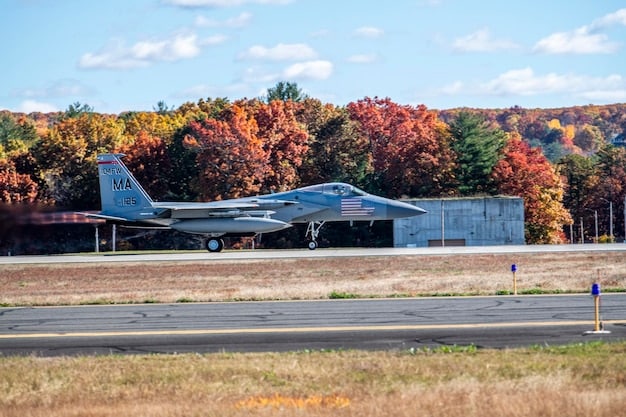US Arms Sales to Saudi Arabia: Implications for Regional Stability

The latest US arms sales to Saudi Arabia carry significant implications for regional stability, potentially exacerbating conflicts, fueling human rights concerns, and shifting the balance of power in the Middle East.
The debate surrounding what are the implications of the latest US arms sales to Saudi Arabia for regional stability? is complex and multifaceted. These deals, often justified by strategic partnerships and economic benefits, can have far-reaching consequences, influencing power dynamics, conflict resolution, and human rights within the region.
Understanding US Arms Sales to Saudi Arabia
US arms sales to Saudi Arabia are a long-standing practice rooted in strategic alliances and economic interests. These sales involve a wide array of military equipment, from advanced aircraft and missile systems to armored vehicles and logistical support. The rationale behind these deals often centers on promoting regional security, countering terrorism, and bolstering the US economy through defense exports.
Historical Context
The relationship between the US and Saudi Arabia has been crucial for decades, particularly in maintaining stability in the oil-rich Middle East. Arms sales have been a key component of this relationship, providing Saudi Arabia with the means to defend itself, according to US policy, and contributing to a sense of shared security interests.
Types of Arms Sold
The spectrum of military equipment sold to Saudi Arabia includes sophisticated weaponry such as F-15 fighter jets, Patriot missile defense systems, and precision-guided munitions. These advanced technologies are intended to enhance Saudi Arabia’s defense capabilities and enable it to respond to regional threats effectively.

- Strategic Partnership: Strengthening the long-term alliance between the US and Saudi Arabia.
- Economic Benefits: Boosting the US defense industry and creating jobs.
- Regional Security: Enhancing Saudi Arabia’s ability to counter-terrorism and deter aggression.
However, these sales are not without controversy. Critics argue that they exacerbate regional conflicts, contribute to human rights abuses, and undermine efforts to promote peace and stability. Understanding these competing perspectives is crucial to assessing the true implications of US arms sales to Saudi Arabia.
The Impact on Regional Conflicts
One of the most significant concerns surrounding US arms sales to Saudi Arabia is their potential impact on regional conflicts. The influx of advanced weaponry can escalate tensions, fuel proxy wars, and prolong existing conflicts, such as the war in Yemen.
Escalation of Conflicts
The availability of sophisticated arms can embolden Saudi Arabia to engage in military interventions and escalate existing conflicts. This can lead to a dangerous cycle of violence, with devastating consequences for civilian populations.
Proxy Wars and Instability
Arms sales can also fuel proxy wars, as different factions within the region, supported by external powers, compete for influence and control. This can result in prolonged instability and humanitarian crises.
- Increased Military Capabilities: Enhancing Saudi Arabia’s ability to project power in the region.
- Fueling Proxy Conflicts: Exacerbating tensions and fueling proxy wars.
- Humanitarian Consequences: Leading to increased civilian casualties and displacement.
Critics argue that US arms sales contribute to a militarized environment in the Middle East, where conflicts are more likely to be resolved through force than diplomacy. This undermines efforts to promote peaceful resolutions and sustainable stability.
Human Rights Concerns
The human rights record of Saudi Arabia has been a major point of contention in the debate over US arms sales. Critics argue that these sales enable and embolden the Saudi government to commit human rights abuses, both domestically and in its foreign interventions.
Abuses in Yemen
The Saudi-led intervention in Yemen has been particularly controversial, with numerous reports of civilian casualties resulting from indiscriminate airstrikes. Critics argue that US-supplied weapons have been used in these attacks, making the US complicit in human rights violations.
Domestic Repression
Domestically, Saudi Arabia has been criticized for its suppression of dissent and lack of political freedoms. Arms sales contribute to the government’s ability to maintain its grip on power and suppress any form of opposition.

- Civilian Casualties: Increased risk of civilian casualties in Saudi-led military operations.
- Enabling Repression: Strengthening the Saudi government’s ability to suppress dissent.
- Undermining Reforms: Discouraging human rights reforms within Saudi Arabia.
The US government faces increasing pressure to condition arms sales on improvements in Saudi Arabia’s human rights record. However, balancing these concerns with strategic and economic interests remains a complex challenge.
Shifting Balances of Power
US arms sales to Saudi Arabia inevitably affect the regional balance of power, potentially altering the dynamics between Saudi Arabia and its neighbors, including Iran. This can lead to increased competition, mistrust, and the potential for military escalation.
Saudi Arabia vs. Iran
The rivalry between Saudi Arabia and Iran is a central feature of Middle Eastern politics. US arms sales to Saudi Arabia are often viewed as an attempt to counter Iranian influence and maintain a balance of power in the region.
Impact on Neighboring Countries
These sales can also have a ripple effect on neighboring countries, prompting them to seek additional military capabilities to counterbalance Saudi Arabia’s growing power. This can lead to an arms race and increased instability.
Alternative Approaches to Regional Stability
Given the controversies and potential downsides of US arms sales to Saudi Arabia, alternative approaches to promoting regional stability deserve consideration. These alternatives include diplomatic engagement, economic development, and support for civil society.
Diplomatic Engagement
Increased diplomatic engagement can help to de-escalate tensions, foster dialogue, and promote peaceful resolutions to conflicts. This involves working with all relevant actors in the region, including Iran, to find common ground and build trust.
Economic Development
Investing in economic development can address the root causes of instability, such as poverty, inequality, and lack of opportunity. This can help to create more resilient and stable societies, reducing the appeal of extremism and conflict.
These alternative approaches offer a more sustainable path to regional stability, addressing the underlying causes of conflict and promoting long-term peace and prosperity.
| Key Point | Brief Description |
|---|---|
| ⚔️ Conflict Escalation | Arms sales can intensify regional conflicts and proxy wars. |
| ⚖️ Human Rights | Concerns arise over potential abuses with US-supplied weapons. |
| 🤝 Regional Balance | Sales shift power dynamics, influencing Saudi-Iran relations. |
| 🕊️ Alternative Approaches | Diplomacy and economic development offer sustainable stability. |
Frequently Asked Questions
▼
The US sells arms to Saudi Arabia for strategic partnership, economic benefits, and to enhance regional security, countering terrorism, and maintaining balance against Iran.
▼
Concerns include the escalation of regional conflicts, potential human rights abuses using US-supplied weapons, and the destabilizing effect on the balance of power.
▼
Critics argue that US arms have contributed to civilian casualties and prolonged the conflict, implicating the US in potential human rights violations in Yemen.
▼
Alternative approaches include diplomatic engagement, emphasizing dialogue and peaceful resolutions, and investing in economic development to address root causes of conflict.
▼
US arms sales to Saudi Arabia intensify the Saudi-Iran rivalry, as they are seen as an effort to counter Iranian influence and maintain a regional balance of power.
Conclusion
In conclusion, the implications of US arms sales to Saudi Arabia for regional stability are complex and far-reaching. While these sales are intended to promote strategic alliances and economic benefits, they also carry the risk of exacerbating conflicts, fueling human rights concerns, and shifting the balance of power in the Middle East. A comprehensive understanding of these competing factors is essential for policymakers to make informed decisions that promote long-term peace and stability in the region.





